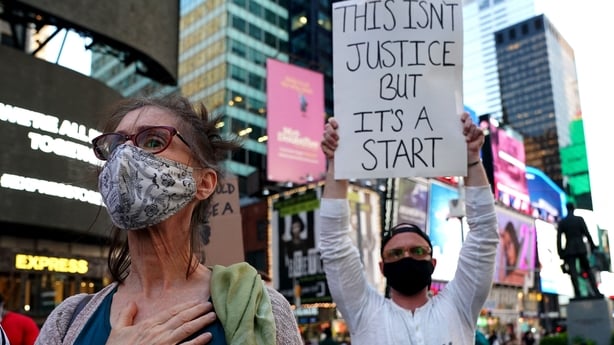In May last year, Minneapolis police officer Derek Chauvin killed George Floyd by kneeling on his neck for nine minutes and twenty-nine seconds.
On a video filmed by a by-stander, Mr Floyd could be heard pleading for his life and uttering his dying words: "I can't breathe".
The footage went viral and sparked a global protest movement demanding an end to racial injustice and police brutality.
Covering the Black Lives Matter protests last year, I was struck by the fact that it was not just members of the African American community who were marching. The demonstrators came from all races and backgrounds.
The calls for change were never louder and the campaign for equality had a new momentum.
When a jury convicted Derek Chauvin in April, I watched crowds celebrate outside the Minneapolis courthouse but many of those I spoke to used words like "stepping stone" and a "move in the right direction".
They saw the guilty verdicts as a starting point rather than a turning point in the battle for criminal justice reform.
There is now renewed focus on that struggle after Derek Chauvin received a 22-and-a-half year sentence.
Former police officer Derek Chauvin sentenced to 22-and-a-half years for the murder of George Floyd in Minneapolis last year | https://t.co/PsQ7bZ1cgt pic.twitter.com/jOGLCXTrN9
— RTÉ News (@rtenews) June 25, 2021
The civil rights campaigner Reverend Al Sharpton said that while it was the longest ever sentence for such a case, it was not a cause for celebration.
"One sentence does not solve a criminal justice problem," he said.
In March, the US House of Representatives passed the George Floyd Justice in Policing Bill which would ban choke holds and no-knock warrants. It would also establish a national police misconduct registry and remove certain legal protections for police officers.

The US President Joe Biden had wanted to sign the bill into law on the first anniversary of George Floyd's death, which fell on 25 May.
He was unable to do so, however, as the legislation had not yet been passed by the US Senate amid disagreements between Republicans and Democrats.
On Thursday, Congressional negotiators said they had agreed to a bipartisan framework for overhauling policing procedures.
"After months of working in good faith, we have reached an agreement on a framework addressing the major issues for bipartisan police reform," the statement read.
"There is still more work to be done on the final bill, and nothing is agreed to until everything is agreed to. Over the next few weeks, we look forward to continuing our work toward getting a finalised proposal across the finish line."
Passing one piece of police reform legislation will not end the systemic racism that people continue to encounter in the US, but many believe it would at least be a step in the right direction.







